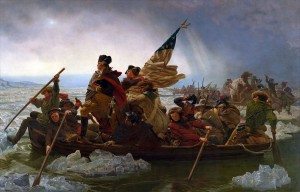


One of the best books I’ve ever read on American history is Washington’s Crossing by David Hackett Fischer. I’ve always been an admirer of the painting Washington Crossing the Delaware by German American artist Emanuel Leutze. The painting of course has been criticized mentators for its inaccuracy. Fischer notes in the first chapter of his book:
American iconoclasts made the painting a favorite target. Post-modernists studied it with a skeptical eye and asked, “Is this the way that American history happened? Is it a way that history ever happens? Are any people capable of acting in such a heroic manner?”
One of the interesting things that Fischer notes is that in the 1950s the painting was removed for a time from Metropolitan Museum of Art because “romantic history paintings passed out of fashion among sophisticated New Yorkers.” He also notes that “among the American people the painting has never passed out of fashion.”
The introduction to Fischer’s book is an excellent defense of the painting, not so much for its historical accuracy, but its historical understanding of the momentous crossing of the Delaware in 1776. pliments Leutze for understanding that America’s “Revolution was truly a world event.” He also pays pliment to the artist for depicting, “that people could organize a society on the basis of liberty and freedom, and could actually make it work.”
One of our evening speakers at Acton University was artist Makoto Fujimura. He offers his own perspective and defense of the painting in mencement speech at Cairn University in May of 2014. Fujimura understands too the painting is not most notable for its historical accuracy but the story it tells to the world:
Leutze painted this image as a bi-cultural artist, depicting objectively what American democracy can mean to an outsider. The painting was never meant to be simply a historical account; he needed to depict not only Washington crossing as a historical reality, but to capture the very essence and ideal of democracy itself.
What Leutze wanted to convey to his friends was a picture of America led by destiny and extraordinary leadership, with a diverse coalition of unlikely heroes gathered together in a boat cast into the icy waves.
Now, look with me at the painting, and into the boat…
Notice who is in the boat. Of course there is George Washington, and his aide, Col. James Monroe, is by his side. But at the front and the back of the boat are two figures wearing buckskin trousers and moccasins, of a Native American heritage. In front of George Washington is a African American, and next to him is a man in a Scottish bonnet: and many suspect that the person rowing the boat in red seems to be a woman.
Leutze was depicting a picture of America. As a visual way to incarnate the American ideal to his homeland in Germany, he intentionally did not paint the Delaware. No, he was in Germany. The river is the Rhine!
Refracting in the American Hall of the Metropolitan Museum today is an iconic work of a German artist, a foreigner’s painting of a land and image far away, recalling an evening that answered a call to destiny. It was not created by a local patriot painting a nationalistic image, but by an outsider peering in, much in the way that Alexis de Tocqueville reimagined America’s goodness as a Frenchman in 1835, with words which resonate today, even in this cynical 21st century America:.
“America is great because she is good. If America ceases to be good, America will cease to be great.” (Alexis de Tocqueville)
We were truly blessed to have had Fujimura at Acton University this year. I think he broadens our own perspective and helps us to reach new audiences, much like the kind of illumination that he can bring to an extremely important painting like Leutze’s. That Fujimura sees the painting in a similar manner to Fischer, in my mind, as somebody who is not a painter, speaks very highly to his credibility and skill as an artist. It also shows that Fujimura has a clear understanding of liberty and is an important figure we can all learn from going forward.









